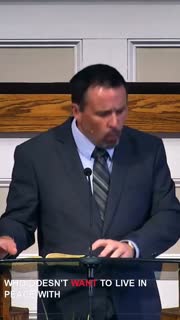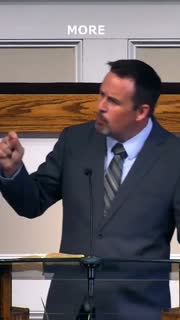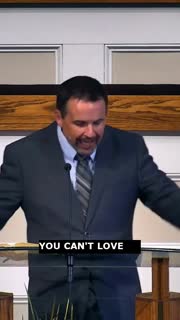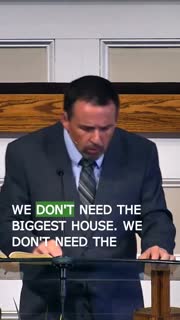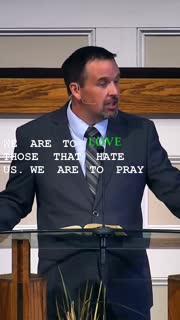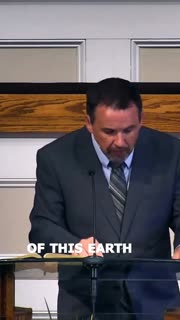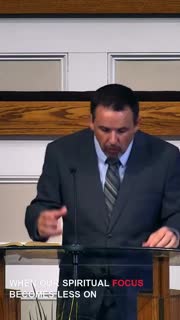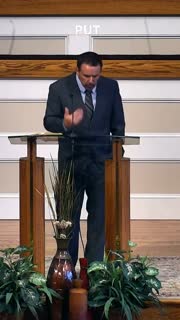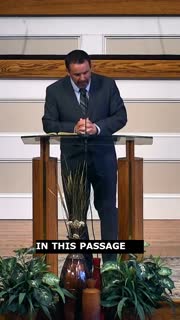Shining Your Light: Trusting God Over Money
Devotional
Sermon Summary
Bible Study Guide
Sermon Clips
### Quotes for Outreach
1. "Throughout his sermon, Jesus has demonstrated that we as his followers should be different than the world around us. The way that we treat others, the way that we respond to problems, the way that we live in this world should be different. And as we live differently, we will shine the light of the gospel to an unsaved world around us. They will see that Jesus makes us different. That he makes our lives better." [25:05] (33 seconds)
2. "Who doesn't want to live in peace with their neighbor? Who doesn't want to have a committed relationship with their spouse? Who doesn't want to live in love with everyone around us? That is an appealing life to everyone. That's a type of life that we all aspire to. Aspire and desire to have. And that's the type of life that Jesus is offering to his followers and encouraging us to live." [25:40] (26 seconds)
3. "God cares more about our hearts than he does about our bank accounts. God cares more about your heart than what you do with your money. God cares more about your heart than how much you give to the church. He cares more about your heart than how much you save for your personal life. God looks to the heart." [28:55] (23 seconds)
4. "You can't love God and love money at the same time. You can't live for God and live for money at the same time. You have to make a choice. The Bible tells us in 1 Timothy, chapter number six, for the love of money is the root of all evil, which while some coveted after, they have erred from the faith and pierced themselves through with many sorrows." [43:33] (23 seconds)
5. "We don't need the biggest house. We don't need the nicest car. We don't need the latest version of the cell phone. We're content with what we have. We're not covetous for what we don't have. We act like Jesus Christ and are willing to humble ourselves and lower ourselves for the benefit of other people. We're willing to go without so that other people may have." [37:34] (25 seconds)
### Quotes for Members
1. "We are to love those that hate us. We are to pray for them. That curse us and speak evil about us. That gossip about us at the workplaces. We are to do good to them. To our neighbors that do evil to us. And that cause us problems. And we're to pray for people that do all wrong against us. That use us. That persecute us. That's hard to do. But that's possible through the grace of Jesus Christ in our lives." [10:46] (34 seconds)
2. "The treasures of this earth are only temporary. He says in verse number 19, lay not up for yourselves treasures upon the earth where moth and rust does corrupt and where thieves break through and steal. Treasures are only temporary. Have you ever been to a landfill? I mean, those places are filled with a whole bunch of stuff, with toys, with cars, with shiny objects that people just had to have, but now they are junk." [30:58] (30 seconds)
3. "When our spiritual focus becomes less on God and more on finances, things can get a little blurry. They can get a little cloudy in our spiritual walk. And when our focus changes, it affects the rest of our lives. When the eye is clear and it doesn't have any problems and it's focused on the right things, the rest of our life is good. But when we stop focusing on God, things start to get a little cloudy." [41:30] (30 seconds)
4. "We must put our trust in God and not money. The unsaved seek after money. It says it in verse 32, but after all these things do the Gentiles seek. But the followers of Jesus should be different. We don't worry about all that other stuff. We trust God. We shouldn't be lumped in with the 70% of other Americans who are stressed about finances. We know God is a good God. We know that God is sovereign, that he's in control." [55:11] (30 seconds)
5. "Jesus tells us in this passage that we can shine our light by being different with our finances. We're focused on God, loving God, seeking God, trusting God, not money. We're not worried about tomorrow and planning our lives around our retirement. We see the evil that is in our world today and therefore, we use our resources to advance God's kingdom." [59:19] (26 seconds)
Ask a question about this sermon
1. "Throughout his sermon, Jesus has demonstrated that we as his followers should be different than the world around us. The way that we treat others, the way that we respond to problems, the way that we live in this world should be different. And as we live differently, we will shine the light of the gospel to an unsaved world around us. They will see that Jesus makes us different. That he makes our lives better." [25:05] (33 seconds)
2. "Who doesn't want to live in peace with their neighbor? Who doesn't want to have a committed relationship with their spouse? Who doesn't want to live in love with everyone around us? That is an appealing life to everyone. That's a type of life that we all aspire to. Aspire and desire to have. And that's the type of life that Jesus is offering to his followers and encouraging us to live." [25:40] (26 seconds)
3. "God cares more about our hearts than he does about our bank accounts. God cares more about your heart than what you do with your money. God cares more about your heart than how much you give to the church. He cares more about your heart than how much you save for your personal life. God looks to the heart." [28:55] (23 seconds)
4. "You can't love God and love money at the same time. You can't live for God and live for money at the same time. You have to make a choice. The Bible tells us in 1 Timothy, chapter number six, for the love of money is the root of all evil, which while some coveted after, they have erred from the faith and pierced themselves through with many sorrows." [43:33] (23 seconds)
5. "We don't need the biggest house. We don't need the nicest car. We don't need the latest version of the cell phone. We're content with what we have. We're not covetous for what we don't have. We act like Jesus Christ and are willing to humble ourselves and lower ourselves for the benefit of other people. We're willing to go without so that other people may have." [37:34] (25 seconds)
### Quotes for Members
1. "We are to love those that hate us. We are to pray for them. That curse us and speak evil about us. That gossip about us at the workplaces. We are to do good to them. To our neighbors that do evil to us. And that cause us problems. And we're to pray for people that do all wrong against us. That use us. That persecute us. That's hard to do. But that's possible through the grace of Jesus Christ in our lives." [10:46] (34 seconds)
2. "The treasures of this earth are only temporary. He says in verse number 19, lay not up for yourselves treasures upon the earth where moth and rust does corrupt and where thieves break through and steal. Treasures are only temporary. Have you ever been to a landfill? I mean, those places are filled with a whole bunch of stuff, with toys, with cars, with shiny objects that people just had to have, but now they are junk." [30:58] (30 seconds)
3. "When our spiritual focus becomes less on God and more on finances, things can get a little blurry. They can get a little cloudy in our spiritual walk. And when our focus changes, it affects the rest of our lives. When the eye is clear and it doesn't have any problems and it's focused on the right things, the rest of our life is good. But when we stop focusing on God, things start to get a little cloudy." [41:30] (30 seconds)
4. "We must put our trust in God and not money. The unsaved seek after money. It says it in verse 32, but after all these things do the Gentiles seek. But the followers of Jesus should be different. We don't worry about all that other stuff. We trust God. We shouldn't be lumped in with the 70% of other Americans who are stressed about finances. We know God is a good God. We know that God is sovereign, that he's in control." [55:11] (30 seconds)
5. "Jesus tells us in this passage that we can shine our light by being different with our finances. We're focused on God, loving God, seeking God, trusting God, not money. We're not worried about tomorrow and planning our lives around our retirement. We see the evil that is in our world today and therefore, we use our resources to advance God's kingdom." [59:19] (26 seconds)

